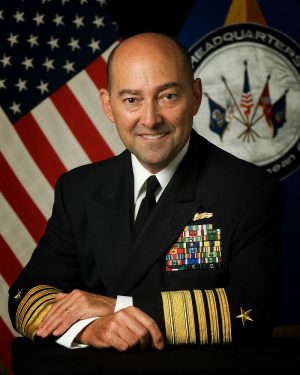
I didn't know Albright, who had been
The result, "Active Engagement, Modern Defense," was adopted at NATO's 2010 summit in
As you would expect, the strategic concept reflected the times: It was full of references to counterterrorism,
Perhaps the most ironic part of the 2010 strategy are the words: "NATO poses no threat to
While it is certainly true that
This week, for the first time since 2010,
Look for strong words that will codify significant defense increases, exemplified by Germany's extraordinary near-doubling
of its military budget for this year. Many more nations will hit the alliance goal of 2% of GDP devoted to defense. The strategic
concept will also likely outline an increase in NATO's standing response forces. (Until now,
There will also likely be an underscoring of NATO's commitment to
Cyberwarfare will feature far more prominently than in the 2010 document. The number of devices connected to the "internet
of things" has increased from around 7 million in 2010 to well above 50 million today. This represents both convenience (I
can open my garage door from 2,000 miles away!) but also a vast threat area that can be penetrated by enemy nations and non-state
actors. Recent experience blunting Russian cyberattacks on
Unlike in 2010, this long-term plan will describe
Finally, the concept will emphasize that applications for expansion will be welcome, subject to the requirements for entry
laid out in the
All these initiatives are sensible and necessary. It is worth remembering, however, how wrong our 2010 document was in the
case of
We may be headed toward a more constructive relationship with
But the process of thinking through the potential challenges, crafting a document that lays out a broad course of action, and working together to implement it, will inherently make the alliance more prepared for whatever the next decade brings.
This 2022 strategic concept will emphasize the core strengths of
(COMMENT, BELOW)
Stavridis is a Bloomberg columnist. He is a retired U.S. Navy admiral and former supreme allied commander of NATO, and dean emeritus of the Fletcher School of Law and Diplomacy at Tufts University. He is also an operating executive consultant at the Carlyle Group and chairs the board of counselors at McLarty Associates.
Previously:
• 04/13/22 Nukes? Ukraine war's most potent weapon may be a cell phone
• 01/18/22 Russia is pushing Finland and Sweden toward NATO
• 10/20/21 What Colin Powell taught me about war and optimism
• 09/14/21 Why the U.S. Navy is hunting pirates off Africa
• 07/29/21 Cuba and how Biden can avoid another Mariel boatlift
• 07/01/21 Donald Rumsfeld never gave in
• 02/16/21 Keeping troops in Afghanistan makes America safer
• 08/19/20 Military reasons to celebrate the Israel-UAE deal
• 07/02/20 Taliban bounties would be a new low even for Putin
• 01/02/20 May the 'Space Force' be with you
• 08/02/19 What Iran will do next, and how to stop it
• 05/06/19 The 'Five Eyes' intelligence-sharing alliance should expand, starting with Israel and Japan
• 04/24/19 Sri Lanka attacks mark the birth of terrorism 3.0
• 01/14/19 Iran's tiny navy is trying to revive the Persian Empire
• 06/04/18 US was right to give China's navy the boot
• 06/04/18 Big winner of Colombia's election is the US
• 05/17/18 Great power politics is back as U.S. aims at Russia with resurrected Navy fleet
• 03/20/18 Fake advice for Putin's fake win


 Contact The Editor
Contact The Editor
 Articles By This Author
Articles By This Author